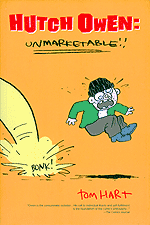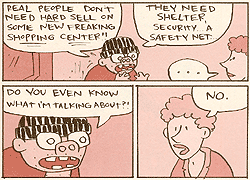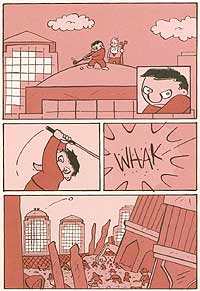
|
Part of the do-it-yourself generation of young comix makers that include James Kochalka and Jeffery Brown, Tom Hart first introduced Hutch Owen in 1994's self-published "Hutch Owen's Working Hard." Rendered in a blunt scrawl, its freedom from convention and its unusual political and social content made it a memorable debut for those lucky enough to find it. (Both this and other tales later appeared in 2000's "The Collected Hutch Owen.") Since then Hart has worked on other projects but Hutch Owen has continued as his enduring, evergreen character. "Unmarketable" brings together several pieces that have appeared in disparate places, including the web, where Hutch currently has a weekly series.
Hutch is a bum. His big "entrance" on the first pages of the new book, in a story titled "Aristotle," has him staring through a caf window, salivating at the sight of an abandoned, half-full coffee mug. He enters, drinks, and complains about it. Setting up to deliver a lesson on Aristotle to his young admirers Owen becomes incensed at the proprietor's suggestion that they buy something. "I don't pay for things," he says. "And I don't work." A stubborn malcontent with bad teeth and a dirty cap, Hutch has dropped out in order to follow the musings of his mind. Unfortunately this often pits him squarely against the demands of society, inciting his fury. In spite of his best efforts, Hutch finds himself endlessly caught up in various marketing and business schemes. These mix-ups form the core of the series' humor.
 Hutch Owen confronts a uncomprehending marketer
Hutch Owen confronts a uncomprehending marketer |
Usually Hutch finds himself pitted against his bete noir, Dennis Worner, CEO of Worner industries, a multi-national conglomerate. We first see Worner — where else? — presiding over his group of toadying yes-men in a boardroom. He sports a puppet on top of his head as some sort of crazed motivational device. "What is the half-life of your innovation?" he screams, in a perfect parody of corporate newspeak. Hart's musical ear for creating nonsense versions of the aerobicized cynicism of biz language becomes one of the book's biggest pleasures. When Worner later runs into a disguised Hutch spewing stream of consciousness poetry he thinks he's finally found someone who's "not afraid to be an idiot for the bottom line." Instigating "infiltration plan beta-pi," Hutch takes a consultation job.
Tom Hart's Hutch Owen stories follow a path as unpredictable as the marketplace. "Aristotle" ends when Hutch finds himself lost in the desert, on the grounds of Onassis Brand Camp, a sort of Outward Bound for biz execs. Hutch encounters Onassis himself, who berates Hutch for his concept of freedom as being able to come and go as he pleases, beholden to no entity. Counters the mustachioed, cross-trainer-wearing Onassis, "I have met the forces of this world. I have danced and wrestled with its gods. I collude with destiny. That is freedom." Surprisingly, Hart leaves Owen speechless at this, cutting away to a final shot of Worner's coffee company logo being raised over the caf we saw at the beginning. Is it a dose of reality or cynicism that makes Hart end most his Hutch stories unhappily?
 Dennis Worner tees off into the WTC rubble
Dennis Worner tees off into the WTC rubble |
Hart has a drawing style that looks fast and furious, perfectly matching the infuriated nature of the work. But don't let it fool you. There's plenty of care going into both the stories and artwork. Hart keeps the layouts clear but varied and adds some nice touches. The second Hutch story of the book, "Public Relations," has been colored in hues of rose, giving an ethereal tone to its tale of the plans for building a shopping center at the World Trade Center site and the ghosts that haunt it. One story, "The Future," about a time when email will be downloaded directly into your brain and coffee cups will have interactive features about celebrities, appears in a crude, early draft style that reveals how much goes into a finished piece. (As a result it's the weak link of the collection.)
In an age where Donald Trump can get his own reality TV series America badly needs "Hutch Owen: Unmarketable!" One of the few comic creators who daringly make art with a biased agenda, Tom Hart's roguish little conscience character makes for a stimulating acid against our base corporate culture. Short, ugly and abrasive, Hutch Owen is the anti-Pillsbury Dough Boy. Punch his tummy and he'll punch you back.
